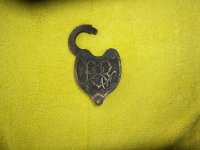prospexican
Full Member
- Nov 28, 2013
- 225
- 49
- Detector(s) used
-
Gemini-3 best expert.
gpx 5000, fisher 2 box, whites sierra madre, eagle ll w big foot, gold bug, GMT, MD-5008, Detectron 2 box. etc. metrotech 480, and ferromagnetic magnetometer FX-3. fisher CZ-20
- Primary Interest:
- All Treasure Hunting
well excuse my English, i know that it is not legal to prospect/ metal detect in a National Park, but i don't Know The difference between a national Forest and a national Park, I was Invited To Utah this coming weekend, feb/13/2015 ibeen getting lost of experience with different metal detectors, but specially with 2 box detectors, and others, a few days ago was my lucky day, i won a tesoro tejon on a raffle and bought a fisher CZ-20 for $ 250 locally, a sand scoop for $20 from the same guy lol. well we just got a TDI whit my partner and i love it, haven't take it to the field yet buy some testing we did we like the way it performs, any way please let me know if there is any legal problems to prospect with metal detectors in Utah National Forest, thanks in advance folks.
Amazon Forum Fav 👍
Last edited:
Upvote
0


 also prohibits these activities, stating, "No person may excavate, remove, damage, or otherwise alter or deface or attempt to excavate, remove, damage or otherwise alter or deface any archaeological resources located on public lands or Indian lands unless such activity is pursuant to a permit...” ARPA exempts the collection of coins for personal use if the coins are not in an archaeological context. In some cases, coins may be part of an historical-period archaeological site, in which case they would be considered archaeological resources and are protected under law. These laws apply to all National Forest System land and do not vary from state to state.
also prohibits these activities, stating, "No person may excavate, remove, damage, or otherwise alter or deface or attempt to excavate, remove, damage or otherwise alter or deface any archaeological resources located on public lands or Indian lands unless such activity is pursuant to a permit...” ARPA exempts the collection of coins for personal use if the coins are not in an archaeological context. In some cases, coins may be part of an historical-period archaeological site, in which case they would be considered archaeological resources and are protected under law. These laws apply to all National Forest System land and do not vary from state to state. just one more question, my partner think that he has locate a ghost town, dating from the 18 century, is it legal to hunt for possible lost coins out there? meaning old coins.
just one more question, my partner think that he has locate a ghost town, dating from the 18 century, is it legal to hunt for possible lost coins out there? meaning old coins. 





